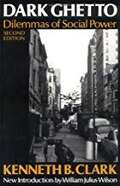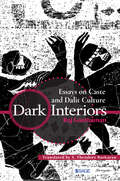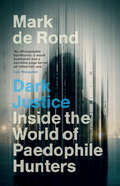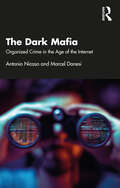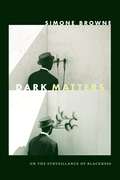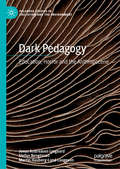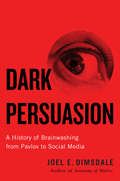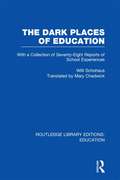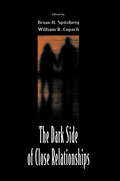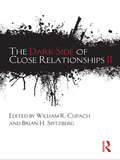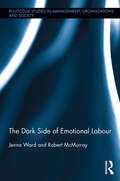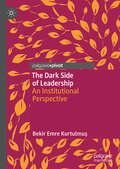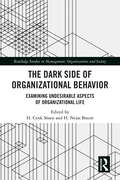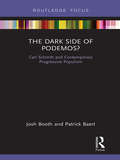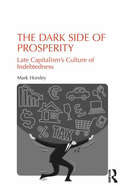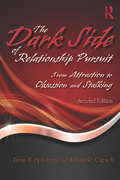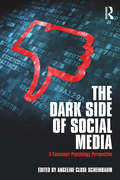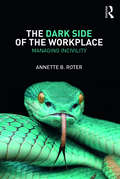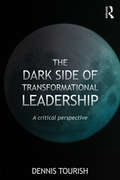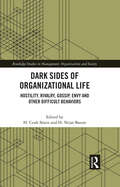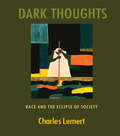- Table View
- List View
Dark Ghetto: Dilemmas of Social Power
by Kenneth B. Clark William Julius Wilson Gunnar MyrdalDescribes how the ghetto separates Blacks not only from white people, but also from opportunities and resources.
Dark Ghettos
by Tommie ShelbyFor Tommie Shelby, the persistence of ghettos raises many thorny questions of morality, and he offers practical answers framed in terms of what justice requires of government and its citizens. His social vision and political ethics calls for putting the abolition of ghettos at the center of reform.
Dark Interiors: Essays on Caste and Dalit Culture
by Raj Gauthaman S. Theodore Baskaran (Translator)‘Except women and dalits, I do not think there is anyone discriminated at birth.’ These words give an idea of Raj Gauthaman’s succinct and provocative critique, translated into English for the first time by Theodore Baskaran. The essays engage with dalit liberation politics, the relationship of dalits with Tamil history and the many strands that constitute radical dalit culture. Gauthaman discusses dalit history and what the progress of non-brahmin politics in Tamil Nadu has meant for dalits. This analysis of the alternative cultural expressions of dalits, politics, art and literature comes from essays written in 1992–2002, which remain perennial and startlingly new. The author’s discussion of Iyothee Thass Pandithar—who preceded Ambedkar by 50 years—of Ambedkar and Periyar, of postmodernism and Subaltern Studies, provides a new cultural history that tells us about dalit assertion today.
Dark Justice: Inside the World of Paedophile Hunters
by null Mark de RondIt is difficult to imagine a more heinous crime than the sexual abuse of children. Yet, terrifyingly, a new case of child sexual abuse is reported every seven minutes. In response to this crisis, self-appointed groups of citizens are fashioning themselves as 'paedophile hunters.' Operating outside the law, these groups use social media to bait and expose those seeking to engage children sexually, both on- and offline. Their work has been remarkably effective, but at what cost? Following four years of unprecedented access to the UK's most prolific team of paedophile hunters, Mark de Rond offers balanced and insightful answers to the perplexing question of why these groups persist in using extreme methods to hold predators to account in view of less harmful alternatives. In doing so, he invites us to consider the societal impacts of paedophile hunters on our laws and institutions, as well as societal cohesion and safety.
Dark Machines: How Artificial Intelligence, Digitalization and Automation is Changing our Living Planet
by Victor GalazThis book offers a critical primer on how Artificial Intelligence and digitalization are shaping our planet and the risks posed to society and environmental sustainability.As the pressure of human activities accelerates on Earth, so too does the hope that digital and artificially intelligent technologies will be able to help us deal with dangerous climate and environmental change. Technology giants, international think-tanks and policy-makers are increasingly keen to advance agendas that contribute to “AI for Good” or “AI for the Planet." Dark Machines explores why it is naïve and dangerous to assume converging forces of a growing climate crisis and technological change will act synergistically to the benefit of people and the planet. It explores why AI and associated digital technologies may lead to accelerated discrimination, automated inequality, and augmented diffusion of misinformation, while simultaneously amplifying risks for people and the planet. We face a profound challenge. We can either allow AI accelerate the loss of resilience of people and our planet, or we can decide to act forcefully in ways that redirects its destructive direction.This urgent book will be of interest to students and researchers with an interest in Artificial Intelligence, digitalization and automation, social and political dimensions of science and technology, and sustainability sciences.
The Dark Mafia: Organized Crime in the Age of the Internet
by Antonio Nicaso Marcel DanesiThis book explores how organized crime has adapted and evolved in sync with ever-expanding technologies to update its popular image and to conduct its covert operations. It shows how organized crime operates in dark virtual spaces and how it can now form a dynamic interactive system with legitimate online spaces, solidifying its criminal exploits and resources, and making them attractive to a new generation of computer users. Focusing on Italian Mafias, Russian and Georgian criminal groups and drug cartels, and Asian crime syndicates such as Yakuza and Triads, this book aims to describe and explain the reasons behind the continuity of online and offline crime, taking into consideration whether or not internet culture has radically changed the way we perceive organized crime and if so how, and thus how the shift in popular imagery that the internet has brought about affects its actual illegal activities. We also consider how organized crime has shifted its locale from the physical to the virtual, how cybercrime has allowed criminal organizations to adapt and reinvent themselves, and how the police now use technology against organized crime. To better understand the new generation of criminals, it is becoming increasingly urgent to understand the latest technologies and how criminals utilize them. The Dark Mafia is an engaging and accessible introduction to understanding virtual organized crime. It will appeal to students and scholars of criminology, sociology, policing, and all those interested in the digital age of organized crime.
Dark Matters: On the Surveillance of Blackness
by Simone BrowneIn Dark Matters Simone Browne locates the conditions of blackness as a key site through which surveillance is practiced, narrated, and resisted. She shows how contemporary surveillance technologies and practices are informed by the long history of racial formation and by the methods of policing black life under slavery, such as branding, runaway slave notices, and lantern laws. Placing surveillance studies into conversation with the archive of transatlantic slavery and its afterlife, Browne draws from black feminist theory, sociology, and cultural studies to analyze texts as diverse as the methods of surveilling blackness she discusses: from the design of the eighteenth-century slave ship Brooks, Jeremy Bentham's Panopticon, and The Book of Negroes, to contemporary art, literature, biometrics, and post-9/11 airport security practices. Surveillance, Browne asserts, is both a discursive and material practice that reifies boundaries, borders, and bodies around racial lines, so much so that the surveillance of blackness has long been, and continues to be, a social and political norm.
Dark Pedagogy: Education, Horror and the Anthropocene (Palgrave Studies in Education and the Environment)
by Jonas Andreasen Lysgaard Stefan Bengtsson Martin Hauberg-Lund LaugesenDark pedagogy explores how different perspectives can be incorporated into a darker understanding of environmental and sustainability education. Drawing on the work of the classic horror author H.P. Lovecraft and new materialist insights of speculative realism, the authors link Lovecraft’s ‘tales of the horrible’ to the current spectres of environmental degradation, climate change, and pollution. In doing so, they draw parallels between how humans have always related to the ‘horrible’ things that are scaled beyond our understanding and how education can respond to an era of climate catastrophe in the age of the Anthropocene. A new and darker understanding of environmental and sustainability education is thus developed: using the tripartite reaction pattern of denial, insanity and death to frame the narrative, the book subsequently examines the specific challenges of potentials of developing education and pedagogy for an age of mass extinction. This unflinching book will appeal to students and scholars of dark pedagogies as well as those interested in environment and sustainability education.
Dark Persuasion: A History of Brainwashing from Pavlov to Social Media
by Joel E. DimsdaleA harrowing account of brainwashing&’s pervasive role in the twentieth and twenty-first centuries This gripping book traces the evolution of brainwashing from its beginnings in torture and religious conversion into the age of neuroscience and social media. When Pavlov introduced scientific approaches, his research was enthusiastically supported by Lenin and Stalin, setting the stage for major breakthroughs in tools for social, political, and religious control. Tracing these developments through many of the past century&’s major conflagrations, Dimsdale narrates how when World War II erupted, governments secretly raced to develop drugs for interrogation. Brainwashing returned to the spotlight during the Cold War in the hands of the North Koreans and Chinese. In response, a huge Manhattan Project of the Mind was established to study memory obliteration, indoctrination during sleep, and hallucinogens. Cults used the techniques as well. Nobel laureates, university academics, intelligence operatives, criminals, and clerics all populate this shattering and dark story—one that hasn&’t yet ended.
The Dark Places of Education: With a Collection of Seventy-Eight Reports of School Experiences (Routledge Library Editions: Education)
by Willi SchohausThe book is divided into two parts. The first forms a survey of the inadequacies of the Swiss school system in the early twentieth century (but the issues it discusses were universal ones which were just as prevalent in the English school system of that time). The second part of the book is a collection of testimonies from former pupils on the worst aspects of their schooling. With reference to the ideals of Pestalozzi the author proposes ways in which to find constructive solutions to the problems of harsh teachers, schools and de-motivated pupils.
Dark River: A Novel (American Indian Literature and Critical Studies Series)
by Louis OwensJacob Nashoba's journey has taken him from his Choctaw homeland in Mississippi to Vietnam and finally to a small reservation in the mountains of eastern Arizona. A tribal ranger, he lives among people far different from any he has known. Balanced precariously between isolation and community, he is drawn to both the fastness of a remote river canyon and the Apaches who have come to be the only family he has. Nashoba's world is peopled by, among others, a bright young man who sells vision quests to romantic tourists, a determined elder whose power makes her a force to be reckoned with on the reservation, a resident anthropologist more "native" than the natives, a corrupt tribal chairman, a former Hollywood extra who shouts at reservation women the scraps of Italian he learned from other "Indian" actors, and the ranger's estranged wife. Confusion and violence follow their encounter with a right-wing militia group training secretly on tribal land. The contrast between these Rambo types and the various Native American characters typifies the sardonic humor running throughout this novel of contemporary Indian identity.
The Dark Side of Close Relationships
by William R. Cupach Brain H. SpitzbergThis collection of essays represents a follow-up to the editors' 1994 publication, The Dark Side of Interpersonal Communication. In the preface to that collection of essays, they argued that "To fully understand how people function effectively requires us to consider how individuals cope with social interaction that is difficult, problematic, challenging, distressing, and disruptive." In this companion volume, the focus expands from social interaction to close relationships. Aside from the inherent need to investigate the bad as well as the good of interpersonal relationships, the editors and their colleagues simply find the dark side metaphor to be intellectually arousing. It stimulates investigation of important yet often neglected phenomena, and it especially encourages consideration of the hidden and forbidden, and the paradoxical and ironic elements of human relating. This volume assembles the cutting-edge work of first rate scholars from the ranks of communication, psychology, sociology, and cognate disciplines. As in the previous text, the subject matter and stylistic approaches are diverse, reflecting the broad and interdisciplinary domain that is the dark side of human affairs. The selection of topics is somewhat selective, reflecting only a sample of emerging scholarship in the interdisciplinary study of relationships. These internationally recognized scholars examine various topics related to the dark side, including fatal attractions, jealousy and envy, misunderstanding, gossip, conflict, codependence, sexual coercion, stalking, relationship termination, unrequited love, and mental health problems in relationships. Some chapters present original data and models, whereas others reconfigure the way in which the understandings of relationships can be better understood. In addition, the bookend chapters examine the ideology, nature, and problems of dark side scholarship. Collectively, the scholarly journeys made in this volume are intended to illustrate the complexities--both moral and functional--involved in close relationship processes. The intent is neither to valorize nor demonize the darker aspects of close relationships, but rather to emphasize their importance to the day-to-day "doing" of relationships. Only by accepting such processes as integral to relationships can their role be fully understood.
The Dark Side of Close Relationships II
by William R. Cupach Brian H. SpitzbergThe Dark Side of Close Relationships II is a completely new and up-to-date version of the original volume published in 1998, featuring new topics and authors. The volume showcases cutting-edge work on important topics by prominent scholars in multiple disciplines. It sheds light on the paradoxical, dialectical, and mystifying facets of human interaction, not merely to elucidate dysfunctional relationship phenomena, but to help readers explore and understand it in relation to a broader understanding about relationships. As previous Dark Side investigations have revealed, negative or dysfunctional outcomes can occur in relationships even though positive and functional ones are expected, and at the same time, positive silver linings are often found in some dark relational clouds. Such nuanced approaches are needed to better account for the complexity of close relationships. A unique and provocative collection, this volume will appeal to relationship researchers in communication, social psychology, family studies, and sociology.
The Dark Side of Emotional Labour (Routledge Studies in Management, Organizations and Society)
by Jenna Ward Robert McMurrayThe Dark Side of Emotional Labour explores the work that the rest of society would rather not think about, the often unseen work that is emotionally disturbing, exhausting, upsetting, and stigmatising. This is work that is simultaneously undesirable and rewarding, work whose tasks are eschewed and yet necessary for the effective function of individual organisations and society at large. Diverse and challenging, this book examines how workers such as the doorman, the HR manager, the waiter and the doctor’s receptionist experience verbal aggression and intimidation; how the prison officer and home carer respond to the emotions associated with physical violence, and; how the Samaritan, banker and veterinarian deal in death and despair. It also considers how different individuals develop the emotional capital necessary to cope with the dark side of emotional labour, and how individuals can make sense of, and come to take satisfaction and pride in, such difficult work. Finally, the book considers what is to be done with darker emotional work, both in terms of the management and care of those labouring on the dark side. Challenging and original, this book gives a voice to those who undertake the most demanding work on our behalf. It will be of interest to researchers and students of organisation studies and its related fields, and to every one of us who is called on to work or manage on the Dark Side.
The Dark Side of Leadership: An Institutional Perspective
by Bekir Emre KurtulmuşContrary to the notion that leaders contribute to positive behaviour within organisations, this book reflects growing interest in the ‘dark side’ of leadership: the unethical and immoral personalities that can reside in positions of power. Drawing on empirical and theoretical analysis, the author examines immorality within leadership and the underlying causes behind this behaviour. Focusing on the impact of institutional pressures, this book analyses how such behaviour is influenced by internal and external factors. By employing a theoretical framework, the author seeks to demonstrate that institutions either compel leaders to be ethical and moral, or in contrast, they actually provide legitimacy for immoral actions. An insightful and thought-provoking read, The Dark Side of Leadership will be of interest to those studying leadership, HRM, and business ethics, as well as social psychology scholars.
The Dark Side of Organizational Behavior: Examining Undesirable Aspects of Organizational Life (Routledge Studies in Management, Organizations and Society)
by H. Cenk Sözen H. Nejat BasımThe Dark Side of Organizational Behavior aims to gather all the micro and meso level topics about the dark side of organizations that may guide management practitioners, researchers, and students. The history before the modern human civilization is full of multiple types of conflicts, wars, struggles and violence. Modernization project has constructed a desired reality of human being and has somehow concealed the dark side of human interactions. Through this outlook, this book explores the realities of the dark side of organizations and how these realities may have the potential to change previous assumptions about business life. The field of Organizational Behavior is dominated by the positive aspects of the business life, but conflict, war, struggle, and violence have always been a part of history. It is not possible to isolate organizational participants from negative emotions like hostility, dislike, hate, jealousy, rage, and revenge. A manager may devote most of their time to cope with conflicts, deviant behaviors, ambitious individuals, gossips, and dysfunctional rivalry among employees. It is evident that negative events and interactions among employees cost more time and energy for a manager than the positive side of organizational life. Therefore, exploring the realities of the dark side of organizations may have the potential to change previous assumptions about business life. This book will be of interest to researchers, academics, practitioners, and advanced students in the fields of organizational studies and behavior, human resource management, employment relations, and organizational psychology.
The Dark Side of Podemos?: Carl Schmitt and Contemporary Progressive Populism (Routledge Advances in Sociology)
by Josh Booth Patrick BaertIn 2014 a new progressive party, Podemos, emerged on the Spanish political scene. Within just over two years it had become the country’s third-biggest party, winning a slew of seats in parliament and regularly making headline news. While some see Podemos as the saviour of Spanish democracy, others have accused it of corrosive populism. But what few have noticed is that behind its distinctive rhetoric lies a thinker closely associated with Germany’s Third Reich: Carl Schmitt. Why has an ostensibly progressive and avowedly anti-fascist political party taken up Schmitt’s ideas? The puzzle only deepens when we learn of Schmitt’s links with Francisco Franco’s dictatorship. In The Dark Side of Podemos?, Booth and Baert explain why Schmittian theory resonated with Podemos’ founders. In doing so, the authors position Podemos and the ideas that guide it within the context of recent Spanish history and ongoing politics of memory, revealing a story about how personal and political narratives have combined to produce a formidable political force. This enlightening monograph will appeal to undergraduates and postgraduates, as well as postdoctoral researchers, interested in fields such as Politics, Political Theory and Sociology. It will also be relevant to those curious about contemporary Spanish politics, the nature of populism, the future of the European left, or Carl Schmitt and his links with Spain.
The Dark Side of Prosperity: Late Capitalism’s Culture of Indebtedness
by Mark HorsleyThis book offers a critical analysis of consumer credit markets and the growth of outstanding debt, presenting in-depth interview material to explore the phenomenon of mass indebtedness through the life trajectories of self-identified debtors struggling with the pressures of owing money. A rich and original qualitative study of the close relationship between financial capitalism, consumer aspirations, social exclusion and the proliferation of personal indebtedness, The Dark Side of Prosperity examines questions of social identity, subjectivity and consumer motivation in close connection with the socio-cultural ideals of an ’enjoyment society’ that binds the value of the lives of individuals to the endless acquisition and disposal of pecuniary resources and lifestyle symbols. Critically engaging with the work of Giddens, Beck and Bauman, this volume draws on the thought of contemporary philosophers including Zizek, Badiou and Rancière to consider the possibility that the expansion of outstanding consumer credit, despite its many consequences, may be integral to the construction of social identity in a radically indeterminate and increasingly divided society. A ground-breaking work of critical social research this book will appeal to scholars of social theory, contemporary philosophy and political and economic sociology, as well as those with interests in consumer credit and cultures of indebtedness.
The Dark Side of Relationship Pursuit: From Attraction to Obsession and Stalking
by Brian H. Spitzberg William R. CupachAwards and Praise for the first edition: Recipient of the 2006 International Association for Relationship Research (IARR) Book Award "This text, as it presently stands, is THE go-to text for stalking researchers. That is my opinion and the opinion of multiple fellow scholars I know in the field. It rarely sits on my shelf, but rather is a constant reference on my desk. I can always count on these authors to have done an extensive review of literature. I thought I was thorough, but they are always providing me with new references."--Dr. H. Colleen Sinclair, Associate Professor of Psychology, Mississippi State University "Cupach and Spitzberg provide the reader with a multidisciplinary framework for understanding the nature and impact of unwanted relationship pursuits. This book is an excellent resource for students and professionals alike who seek to gain knowledge about unwanted relational pursuits and stalking." —Journal of Couple & Relationship Therapy The Dark Side of Relationship Pursuit provides historical and definitional frames for studying unwanted relationship pursuit, and considers the role of the media, law, and social science research in shaping today’s conceptualizations of stalking. The volume integrates research from diverse contributing fields and disciplines, providing a thorough summary and assessment of current knowledge on stalking and obsessive pursuit. Building on the foundation of the award-winning first edition, this revision considers assessment issues, offers an expanded analysis of the meta-analysis data set, and includes coverage of intercultural and international factors. As an increasing number of scholarly disciplines and professional fields study stalking and other forms of obsessive relationship pursuit, this book is a must-have resource for examining interpersonal conflict, social and personal relationships, domestic violence, unrequited love, divorce and relational dissolution, and harassment. It also has much to offer researchers, counselors, and professionals in psychology, counseling, criminal justice, sociology, psychiatry, forensic evaluation, threat assessment, and law enforcement.
The Dark Side of Social Media: A Consumer Psychology Perspective
by Angeline Close ScheinbaumThe Dark Side of Social Media takes a consumer psychology perspective to online consumer behavior in the context of social media, focusing on concerns for consumers, organizations, and brands. Using the concepts of digital drama and digital over-engagement, established as well as emerging scholars in marketing, advertising, and communications present research on some unintended consequences of social media including body shaming, online fraud, cyberbullying, online brand protests, social media addiction, privacy, and revenge pornography. It is a must-read for scholars, practitioners, and students interested in consumer psychology, consumer behavior, social media, advertising, marketing, sociology, science and technology management, public relations, and communication.
The Dark Side of the Workplace: Managing Incivility
by Annette B. RoterThe workplace can be a hotbed of difficulty and incivility—from rumors spread about an individual, to the agonies of stress, to physical attacks and even death. Evidence suggests that not only does incivility have significant implications for employees, organizations and society, it is also on the rise. In recent years we have experienced increased acts of incivility in the workplace, social media and government positions. There is a direct correlation between uncivil behavior and financial outcomes for organizations. It is estimated that stress related to uncivil actions in the workplace costs organizations approximately $300 billion annually. The cost of personal implications for employees is often too high to calculate as individuals experience loss of reputation and significant psychological and physical distress. With the increased use of social media, individuals are experiencing incivility that crosses the boundary between their personal and professional lives. This book delves into the darker side of the workplace, discussing bullying, toxic work environments, corporate psychopaths, the struggles of stress, and more. It combines recent research and case studies to provide an understanding of these behaviors, and offers practical solutions on how to cultivate a healthy working environment.
The Dark Side of Transformational Leadership: A Critical Perspective
by Dennis TourishMost research into leadership has presented leaders as heroic, charismatic and transformational ‘visionaries’. The leader, whether in business, politics or any other field, is the most important factor in determining whether organizations succeed or fail. Indeed, despite the fundamental mistakes which have, arguably, directly led to global economic recession, it is often still taken for granted that transformational leadership is a good thing, and that leaders should have much more power than followers to decide what needs to be done. The Dark Side of Transformational Leadership confronts this orthodoxy by illustrating how such approaches can encourage narcissism, megalomania and poor decision-making on the part of leaders, at great expense to those organizations they are there to serve. Written in a lively and engaging style, the book uses a number of case studies to illustrate the perils of transformational leadership, from the Jonestown tragedy in 1978 when over 900 people were either murdered or committed suicide at the urging of their leader, to an analysis of how banking executives tried to explain away their role in the 2008 financial crisis This provocative and hugely important book offers a rare critical perspective in the field of leadership studies. Concluding with a new approach that offers an alternative to the dominant transformational model, The Dark Side of Transformational Leadership will be an invaluable text for academics interested in leadership, students on leadership courses requiring a more critical perspective, and anyone concerned with how people lead people, and the lessons we can learn.
Dark Sides of Organizational Life: Hostility, Rivalry, Gossip, Envy and other Difficult Behaviors (Routledge Studies in Management, Organizations and Society)
by H Cenk Sözen H Nejat BasımExploring the darkest side of organizations may have a potential to change our previous assumptions about business life. Scholars both in management and organizational research fields have shown interest in the "bright" side of behavioral life and have looked for the ways to create a positive organizational climate and assumed a positive relation between happiness of employees and productivity. These main assumptions of the Human Relations School have dominated the scientific inquiry on organizational behavior. However, "the dark side of organizational life" may have more explanatory power than "the bright side". Hostility, jealousy, envy, rivalry, gossip, problematic personalities, dislike, revenge, and social exclusion are the realities of business life. A manager may devote most of their time to cope with conflicts, deviant behaviors, ambitious individuals, gossips, and dysfunctional rivalry among employees. It is evident that negative events and interactions among employees cost more time and energy for a manager than the positive side of organizational life. This edited collection specifically focuses on these issues and will be of interest to researchers, academics, and advanced students in the fields of management, organizational studies and behavior, sociology, social psychology, and human resource management.
Dark Sides of Organizational Life: Hostility, Rivalry, Gossip, Envy and other Difficult Behaviors (Routledge Studies in Management, Organizations and Society)
by H Cenk Sözen H Nejat BasımExploring the darkest side of organizations may have a potential to change our previous assumptions about business life. Scholars both in management and organizational research fields have shown interest in the "bright" side of behavioral life and have looked for the ways to create a positive organizational climate and assumed a positive relation between happiness of employees and productivity. These main assumptions of the Human Relations School have dominated the scientific inquiry on organizational behavior. However, "the dark side of organizational life" may have more explanatory power than "the bright side". Hostility, jealousy, envy, rivalry, gossip, problematic personalities, dislike, revenge, and social exclusion are the realities of business life. A manager may devote most of their time to cope with conflicts, deviant behaviors, ambitious individuals, gossips, and dysfunctional rivalry among employees. It is evident that negative events and interactions among employees cost more time and energy for a manager than the positive side of organizational life. This edited collection specifically focuses on these issues and will be of interest to researchers, academics, and advanced students in the fields of management, organizational studies and behavior, sociology, social psychology, and human resource management.
Dark Thoughts: Race and the Eclipse of Society
by Charles LemertIn Dark Thoughts, eminent sociologist Charles Lemert dares to say, and explain, what everyone already knows - that the modern world was built on the need of white people to pretend they are not as dark as the next person.Delving poignantly into the history and literature of domination, Lemert retells key moments of the twentieth-century by profiling figures like W.E.B. DuBois, Charlotte Perkins Gilman, Anna Julia Cooper, Nella Larson, Malcolm X, and Muhammad Ali. In a rare and unflinching look at his own complicated history, Lemert also explores his own racism, his struggle with the suicide of his oldest son, as well as growing up as the virtual son of a black mother and his life now as the real father of an African-American daughter. Dark Thoughts speaks to the most urgent social issues at the beginning of the twenty-first century: race relations, multiculturalism, and social justice.
